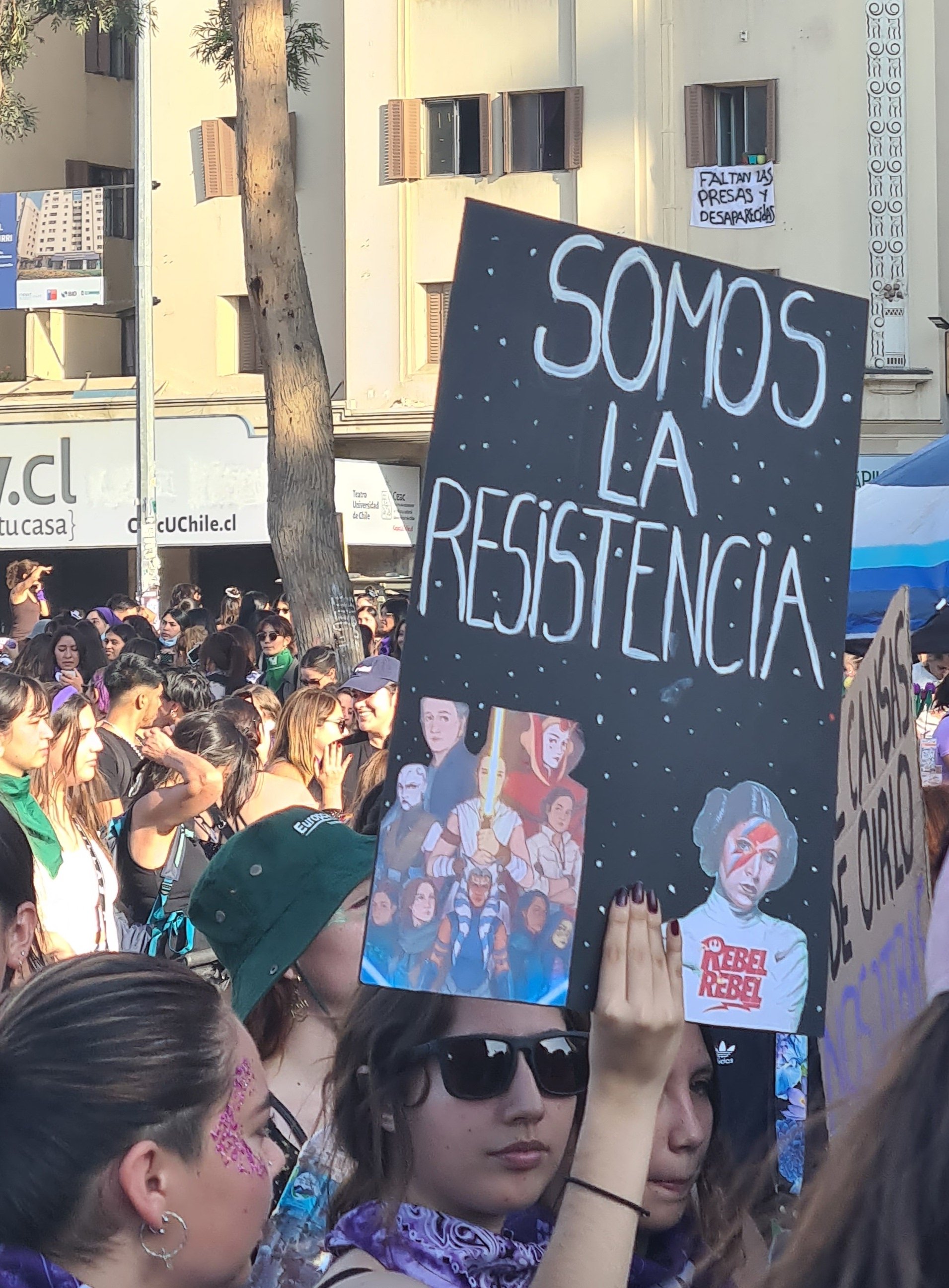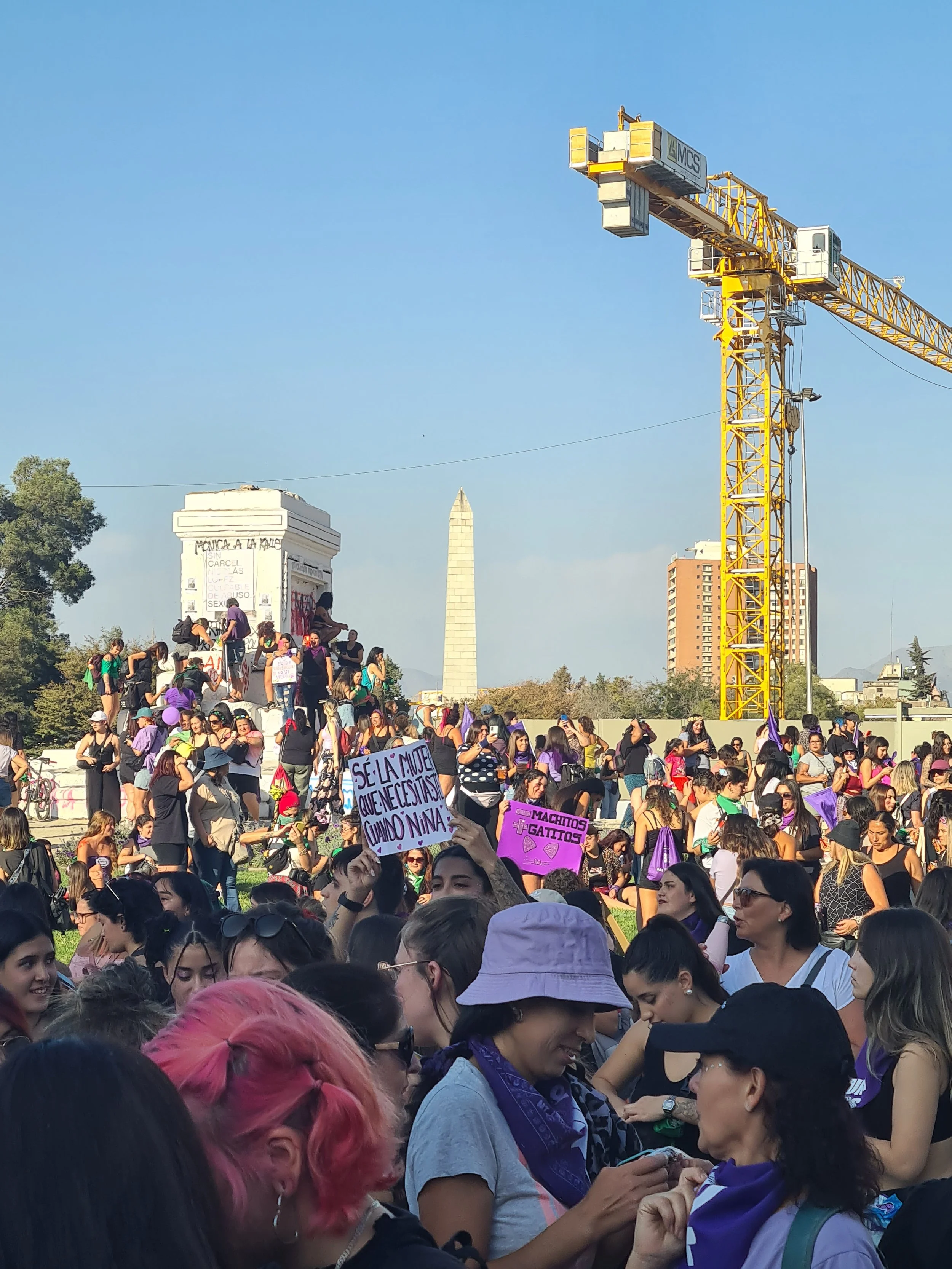International Women’s Day: Marching in Chile
Santiago, Chile, 8th March 2023.
Aprille Scully reflects on her experience at the International Women’s Day march in Santiago, as she marched with hundreds of thousands of protestors and heard their voices roar: "Aborto sí! Aborto no! Es mi decisión!"
As the hottest part of the day subsided, storefronts pulled their shutters and the protest enveloped the whole city centre. It was, by far, the biggest, most lively protest I've ever taken part in. The protesters took over the streets. They were on top of buildings and on top of bus stops. Vigils set up to honour the victims of femicide were set up. I was harrowed to see only 2022 victims were honoured as femicides are too numerous here. Messages in support of abortion rights were being written on buildings and shop fronts, statues of old, reactionary men were spray painted and pro-choice banners draped over them.
In Ireland, police would have intervened at this point to pull people down and threaten arrest. Business owners would have moaned and insisted that a footpath be forged to allow custom to continue. But in Chile, the brutality inflicted by the police during the 2019 protests has made the situation much more explosive. Outside the Parliament, a fence was erected about 500m away preventing protesters from approaching the building. Then, cynically, a row of women carabineros (Chilean riot police) were stationed with shields and batons. Behind them were the men carabineros armoured up and several streets away, tanks and horses carrying police.
““But despite the dire conditions the feminist movement is battling against, I was struck by how joyful the protest was.””
It's been 50 years since a CIA-backed military coup overthrew a democratically elected socialist government in Chile and started the reign of terror that was the Pinochet dictatorship. The dictatorship is over but the constitution that was written and imposed during that regime is still in place enshrining neoliberalism as Chile's economic model. The devastation of this is written all over Santiago.
Pinochet outlawed abortion. Today, abortion is technically allowed in Chile in the following cases; rape, fatal fetal abnormalities and if the life of the mother is threatened. It's a disaster and doesn't safeguard health or autonomy over one's own body.
But despite the dire conditions the feminist movement is battling against, I was struck by how joyful the protest was. There was dancing, theatre, music, and art installations every few steps. The socialist left were there too in a block with the trade unions with banners displaying the iconic "Pan y Rosas." No other political parties were present.
Earlier in the day, I had sat in a park and watched as hundreds of groups of friends arrived and began a long and intricate process of applying makeup, changing into embroidered costumes, and painting messages on their arms and legs. It was reminiscent of Pride in Ireland where a lot of young people put careful consideration into incorporating the Pride colours into what they wear to honour the day.
Many protestors wore what is considered classically "radical" dress. There were topless protesters and protesters wearing balaclavas in the same colourful style as Pussy Riot.
During the height of the abortion rights struggle in Ireland, leaflets were frequently distributed, responding to the most up-to-date situation, and banners were printed that reflected the most acute demand of the moment. Speeches were expected. This was not the case in Santiago. It may be that the printing cost is too expensive, as it is in Argentina. However, that also meant the vast majority of protesters had brought handmade signs. It was inspiring to see the leagues of individual protesters who had prepared in advance and therefore, had articulated their own demands. In Ireland, banners and placards calling for unified demands are commonplace. In Chile, as an outsider that was not part of the build-up, I couldn’t readily understand the perspective of the socialist and trade union block in relation to the demands of the overall protest. I can't say whether there were speeches or not as the crowds were so enormous; people joined the beginning of the route as the crowd I marched in reached its end.
““The demands and slogans written on signs ran the gamut: ... the most prominent - the right to choose.””
The demands and slogans written on signs ran the gamut: in support of transgender rights and a rejection of TERF, justice for the victims of the Pinochet regime, calls for a new constitution, an end to gender-based violence and the most prominent - the right to choose.
The protest was very youthful, my impression of the crowd was that most protesters were younger than 30 and the sweeping majority of protestors were women. For a protest of that scale, it was an inspiring sight!
However, the enthusiasm of the day was tinged with bitterness. Last year’s rejection by referendum of a new constitution was hanging in the air - among other reforms, it would have delivered abortion rights and made Chile the first country ever to enshrine reproductive rights in the constitution. The protests of 2019 forced the redrafting of the constitution, with even the pro-Pinochet right conceding it must be replaced. But the right-wing whipped up xenophobia, fear-mongering and misinformation, managing to win 62% of the vote for ‘Rechazo’, rejecting the proposed constitution.
I spoke to one guy in Valparaíso about the 2019 protests and he was despondent: "Girls were raped by the police. A friend lost an eye because of a rubber bullet fired into his face, they were supposed to aim at the feet... and after all that nothing changed. If I had to do it again, I wouldn't. They won."
The Boric government drew a terrible conclusion from the referendum and it was to make the next draft of the constitution "less progressive". Because the new draft requires more consensus with the right, who were resolutely opposed to the first draft, it sounds like the second draft will be a constitution that won’t address the underlying causes of the protests. It will not include nationalisation of the industries through which the major capitalists in Chile hoard a bulk of the nation’s wealth. [1] Will they keep the progressive line that enshrines reproductive rights as the 400,000 protesters in Chile demand on IWD or will they make demoralising concessions to the conservative right?
““we learned an important lesson during the abortion rights struggle: even when you are presented with a seemingly hopeless situation, ... it is possible to win””
In Ireland, we learned an important lesson during the abortion rights struggle: even when you are presented with a seemingly hopeless situation, a right-wing government, an institutionally strong Catholic church, controlling schools and hospitals, it is possible to win. When many conservative feminists and pundits were telling us we needed to wait for a more progressive government and demand less progressive legislation as the right to choose could scare people off, we resisted any compromises to our rights. We won popular support by drawing out the reality of the situation - highlighting the abortion pills was central to that.
But the situation in Chile is complex. Yes, the illegal abortion pill plays the same role as it did in Ireland. In Ireland, we brought that out into the open to show that abortion is a reality. No more shame! It made the abortion ban untenable. But the strong legacy of the right-wing in Chile and the brutality of the state here is apparent. When we carried abortion pills into the open in Ireland, daring the police to arrest us, we figured that they wouldn’t and their hypocrisy furthered our cause. Here, the testimonial from our friend in Valparaíso and others like him, proves that the legacy of the military coup is strong and the state infrastructure to oppress and make people desaparecer (disappear) is not to be underestimated.
Nonetheless, the spirit reflected on IWD 2023 in Santiago blew me away, the movement is strong, energetic, and inspiring. ¡Éxito!
Notes
The top 10% of Chileans own over 80% of the country’s wealth, while the top 1% alone own almost 50% of the wealth with an average personal wealth valued at $2.67 million (Statistica, 2021). Meanwhile, the bottom 50% of Chileans collectively hold a negative wealth of -0.6%, reflecting their reliance on credit and debt to survive (Statistica, 2021) https://www.byarcadia.org/post/chile-s-social-explosion-inequality-and-the-ghosts-of-pinochet




